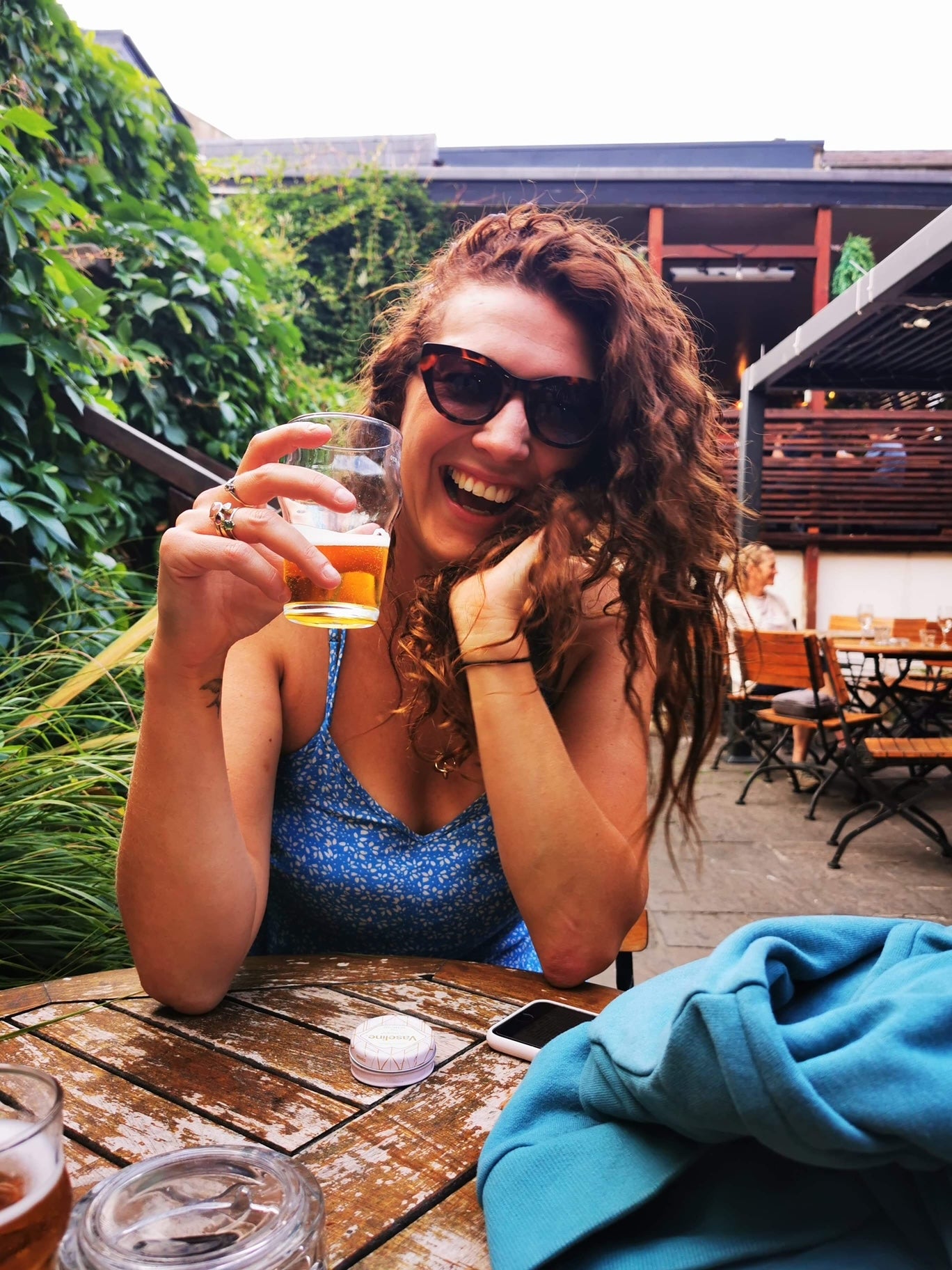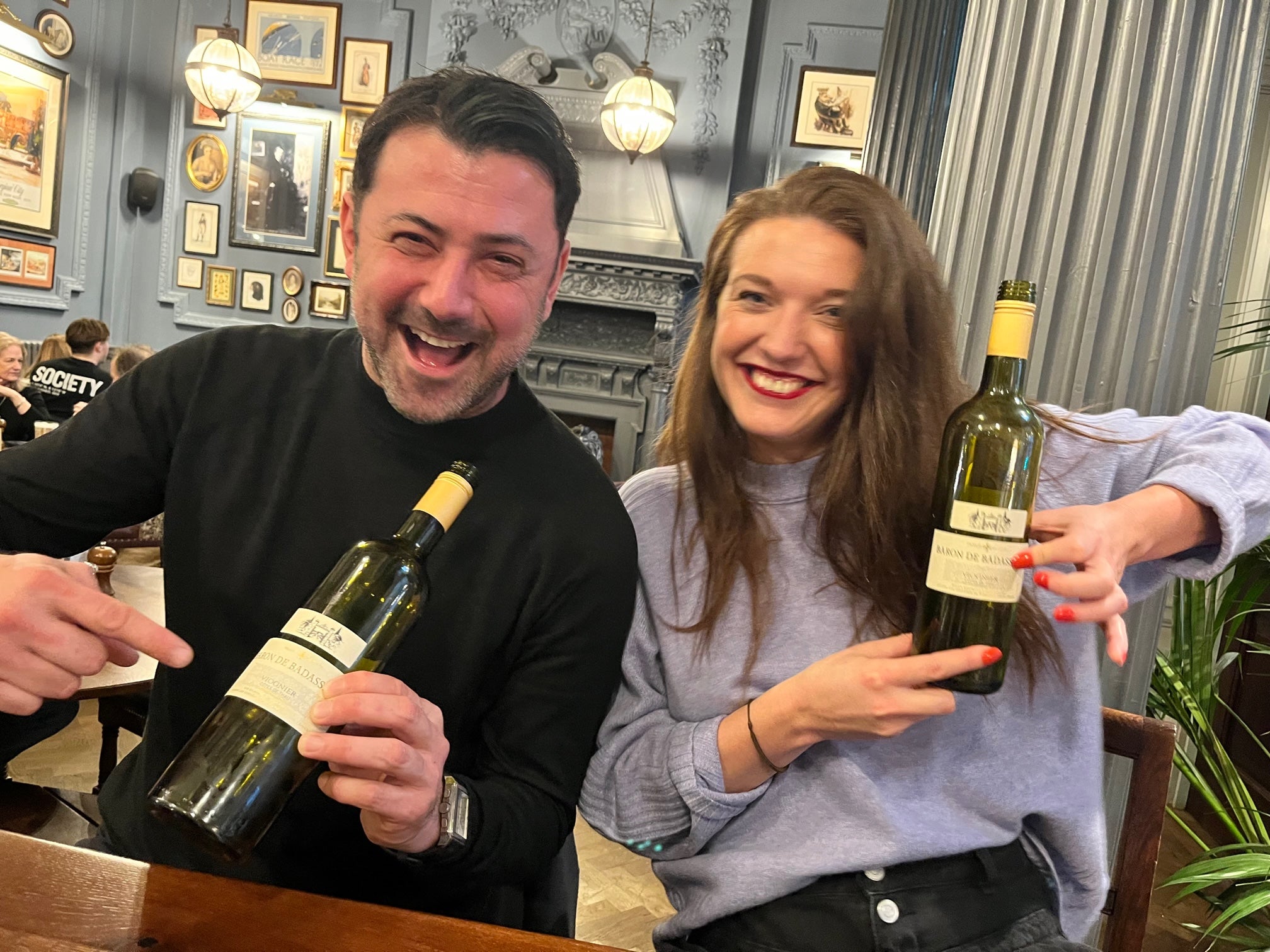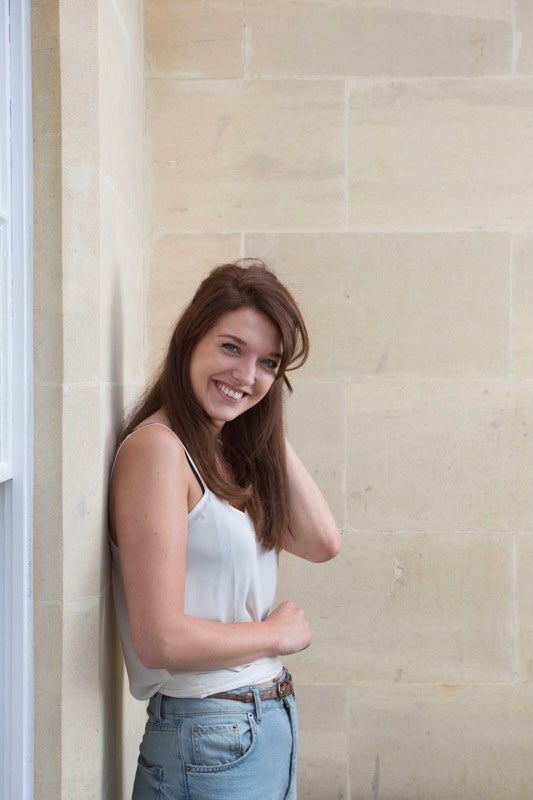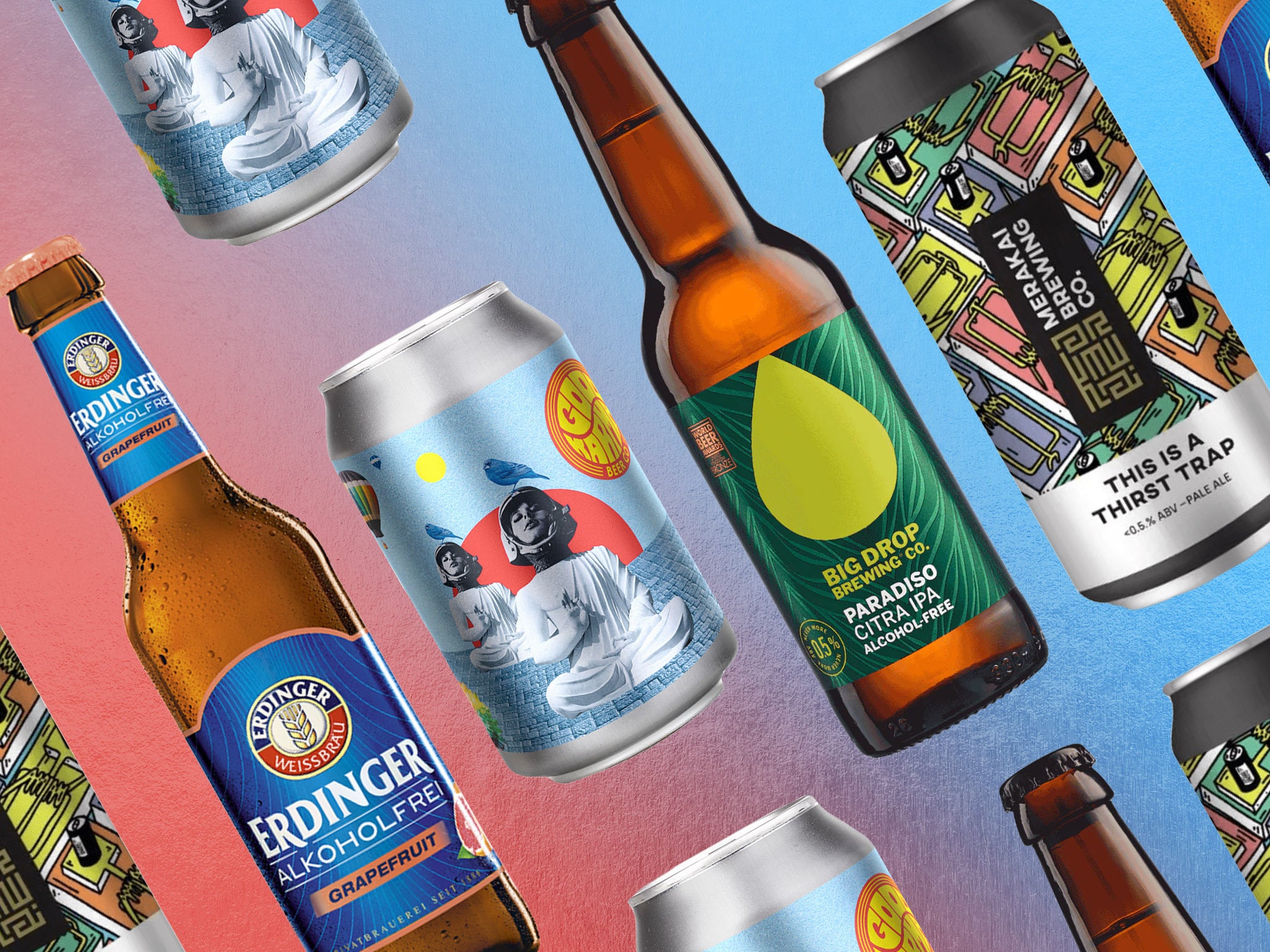Will a sobriety course help me crack Dry January?
Like many people, Lucy Holden doesn’t want to ditch the booze completely, but she wouldn’t mind cutting down. Can a lesson in ‘sober’ wine-drinking help her get through the month?

There’s nothing like the hungover exhaustion after a bout of festive madness to make you reassess your drinking habits. But, to be honest, it’s a regular occurrence for me – I’m just one of those people who never stops imagining going from a wild party girl to someone who could be completely teetotal one day. I enjoy telling myself that, when that happens, I will be the kind of person who exudes library stillness, and whose skin will glow in the dark.
I always think I should quit booze before January becomes dry, but then all the catch-ups get in the way. The fact that I am fresh off the plane from a wine-tasting trip to Arizona when I hear about online courses that are designed to help you drink less is not lost on me. One is even called “Rethinking your wine drinking”, which makes me chuckle as I have the kind of personality that doesn’t believe in spittoons.
But it’s not all Arizona’s fault. My wine intake has been what I like to think of as “slightly too much”, but what doctors would probably call “alcoholic”, for the past year – a year in which I moved to Glasgow and had to make a new life from scratch. I used to start the night with a few beers, but in my thirties this makes me sluggish, and so I’m all about the wine now. I choose red if I want to keep myself tired, and white if I need to keep lively (some would say too much so, and then it makes me snippy).
A friend’s husband tells me she’s kicking the white wine, too. “It also makes her too... energetic,” he says tactfully. “Actually, it makes me insane,” she clarifies.

Because I’m 34, and not yet 74, with enough hangovers under my belt for a lifetime (as my dad of that age says), I’d like to not have to quit alcohol completely. It’s something I enjoy, and makes the stress of being a precariously paid freelancer who lives alone and has to date on the apps far easier.
But like everyone else I know, I do want to cut down. And while I can have a day off easily enough, I worry that I can also drink every night without really thinking about it. A bottle opened is a bottle finished, and my tolerance is high. Which is why, this January, I am determined to give myself a proper break.
It’s not the first time I have tried to kick the habit. I did manage to give up for three months once, which was like hitting a reset button. Dry partying – in 2018 – at first looked like a crate of alcohol-free Peroni (two a night was fine) and early bedtimes. I read more, got up earlier, and, for a while, didn’t know whether I had FOMO or not. Not drinking gave me lots of energy, and way more time. I ran 10km most days, and I looked better than I have done since.
It felt powerful to be able to stop drinking, but it also made me feel sad. I was also young, free and single, and I was starting to feel a bit lonely. Excessive exercise became my new unhealthy habit, and I ended up getting a sports injury. Three months later I’d moved flat, changed my life, was serial dating, and the boozing was back with a vengeance. I had the horrible feeling it made everything sparkle more anyway.
The mindful drinking courses provided by Club Soda are designed exactly for people like me. We can see the benefit of giving up, but enjoy the pull of a fun night out. We love a drink until we don’t, because, while we never have hangovers so terrible we can’t get up, we still struggle with our booze boundaries.
Laura Willoughby, one of Club Soda’s founders, tells me: “Our mindful drinking courses are designed to take people through a process of deciding what they want their relationship with alcohol to be. The end result is not necessarily sobriety, but in our six-month follow-up, every respondent said they still drink less, and feel better than they did before doing the course.”

There are three courses on offer, but I’m most drawn to the wine-specific course (£20) for obvious reasons. Its seven “lessons” also make it feel the most doable and beneficial to me. The company also offers in-depth courses – “How to Drink Mindfully” and “How to Stop Drinking” (each £50) – but the wine course is designed to complement either one by helping you rethink your habits and your long-term aims.
Among the participants, Laura says, whichever course they do, average drinking days are significantly reduced from 4.5 a week to two, while happiness levels are reportedly higher, and people feel more confident about the idea of being able to reduce their intake on their own terms.
The mindful drinking element of the courses underpins the entire sober philosophy. If we think more about why we’re drinking, when we are, and how we feel about it, then we can better understand the situations in which we might reach for a bottle opener purely out of habit or routine. Of those signing up, a third are men, two-thirds are women, and while ages range from 30 to 70 (sober Gen Zs noticeably missing entirely), the average age of those wishing to reassess their drinking is 50.
After signing up, you’re asked to assess your drinking (medical-sounding questions relating to quantity) and your behaviour with alcohol in the last 24 hours (what did you drink; where; with whom), and I am encouraged to do so as I work through the course. This is designed to calculate your mood and give you something tangible to chart.
Once enrolled, you gain access via email to a Club Soda sister site containing the lessons – each a speedy five to 10 minutes’ worth of reading (each “lesson” including roughly five topics, with titles like “Coping with wine o’clock”). Much of the content involves the psychological, social and historical background of wine drinking (misleading health surveys or how the size of glasses ballooned in the 1970s, for example). All of them aim to make you think about your intake. It sounds super simple and slightly obvious, but being forced to think about the context of your drinking and how people drink in society does work. A meditation of sorts.
By the end of my seven lessons, I’ve been calculated to be a social drinker, an emotional drinker, and a routine drinker. “Hmm,” I think, wondering if other people also tick all three boxes. I’ve been taught that I don’t have to see drinking as compulsory in social situations (I do know that I’m less comfortable with my introverted side when I am out), and I’m reassured that I can spend time with important people and not need alcohol.
“Somewhere along the line, it looks like drinking has got wrapped up in your emotional life,” my virtual therapist says to me after analysing my results. “Dealing with difficult feelings can be hard at first, especially if you’ve been drinking to try and push those feelings away,” they continue, just as my real-life therapist said in the pandemic. “Be assured that you’ll begin to develop the capacity to manage your feelings without wine. Over time, you’ll learn to treat yourself with kindness and approach your feelings with curiosity.”
As for the routine drinking, I don’t agree that a fair proportion of it might be happening without me even noticing, given that I often have a robust internal debate before I buy a bottle of wine. “You don’t need it,” one half of my brain says. “Yeah, but you want it, and why not?” says the other. While I might not love my consumption, I understand that I drink more when I’m single because I live alone, work alone (as a freelancer), and, while I wouldn’t say I feel lonely, I do crave a drink while I’m on my own watching TV or writing. I might have to start admitting that maybe I am lonely?
While I’d usually go running to blow off steam, my on-off sports injury has made the kind of high-intensity exercise I need to clear my head impossible. By the end of the wine course, I do feel more relaxed about saying no to booze, and I’m hoping this January might be the first year I manage to cut down more sustainably than I have before. Even just writing down the fact that I have recently been drinking a bottle of wine a day makes me think more about the excessiveness of that.
The idea of mindful drinking makes so much sense, and remembering how much I got done when I was sober is the biggest drive. It might just be time for another three-month break, I think, wondering which of my old jeans I’ll wear first once I’ve lost my champagne-bubbling figure.
The five key tricks to keep January dry:

Go out
Attending events where you would normally have had a drink is great practice for the rest of the year’s realigned intentions. You will learn that the sky does not fall in without booze, and the last thing you want is to feel deprived of social interaction. Feeling like you’re missing out could nudge you towards alcohol again.
Keep it realistic
Don’t add additional goals like doing a 5k run or eating “clean” into the sober equation – if you struggle with one, you are likely to dump the others, if you think of them as one goal. If you can get your drinking under control, then the rest will follow.
Become a social architect
Social events don’t have to be alcohol-forward – take control and suggest things like the cinema or museum lates, where booze is not central to the fun.
Think about home spaces
Kitchens often display glasses or bottles as design pieces, and because they’re so visible, it helps make drinking easier. Put everything more out of reach and sight, and you’ll be less likely to drink.
Explore the non-alcoholic market
Find a new favourite drink that you’ll look forward to opening. Club Soda does “Tailored Tastings” to help you find your new favourite tipple, but many wine shops now offer a variety of interesting alcohol-free bottles.
Join our commenting forum
Join thought-provoking conversations, follow other Independent readers and see their replies
Comments
Bookmark popover
Removed from bookmarks